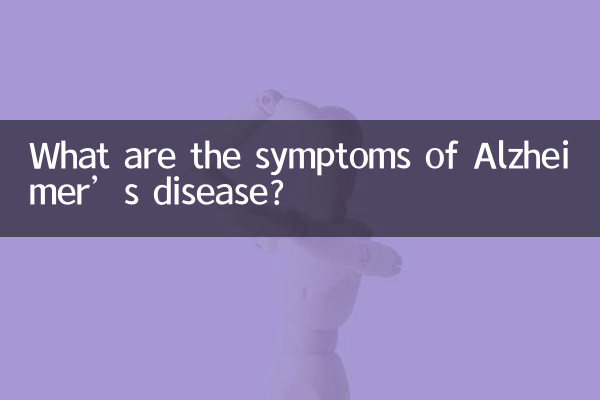What are the symptoms of Alzheimer’s disease?
Dementia (Alzheimer's disease) is a common neurodegenerative disease, mainly characterized by memory loss, cognitive function decline and behavioral abnormalities. As the aging of the population intensifies, Alzheimer's disease has become a health issue of global concern. The following is a summary of Alzheimer’s-related topics and symptoms that have been hotly discussed on the Internet in the past 10 days to help you better identify and prevent it.
1. Common symptoms of Alzheimer’s disease

The symptoms of Alzheimer's disease are usually divided into three stages: early, middle and late stages. The following are the typical manifestations of each stage:
| stage | Main symptoms |
|---|---|
| Early days | Memory loss, difficulty completing familiar tasks, difficulty expressing language, and disorientation in time and space |
| medium term | Significant decline in cognitive function, mood swings, abnormal behavior, and reduced ability to perform daily activities |
| Late stage | Complete loss of self-care ability, inability to recognize relatives and friends, deterioration of body functions, and possible other complications |
2. Topics related to Alzheimer’s that are hotly discussed on the Internet
In the past 10 days, discussions about Alzheimer's disease have mainly focused on the following aspects:
| topic | heat index | Main content |
|---|---|---|
| Early symptom recognition | ★★★★★ | How to spot early signs of Alzheimer’s through changes in daily behavior |
| Precautions | ★★★★☆ | The role of diet, exercise and social activities in preventing Alzheimer's disease |
| Treatment | ★★★☆☆ | Latest research advances in pharmacological and non-pharmacological treatments |
| home care | ★★★☆☆ | How to provide better home care and support for people with dementia |
3. Early warning signs of Alzheimer’s disease
Early detection of Alzheimer's disease is crucial to slowing the progression of the disease. Here are early warning signs to watch out for:
| symptom | Specific performance |
|---|---|
| memory loss | Frequently forgetting recent events and asking the same questions repeatedly |
| Decreased executive function | Difficulty planning or organizing activities, such as managing finances or cooking |
| language barrier | Can't find the right words when speaking, or use simple words repeatedly |
| Time and space confusion | Forget the date or season and get lost in a familiar place |
| mood changes | Irritability, anxiety or depression, significant changes in personality |
4. How to prevent Alzheimer’s disease
Although Alzheimer's disease cannot be completely prevented, the following steps can reduce the risk or slow the progression of the disease:
| Precautions | specific suggestions |
|---|---|
| healthy eating | Eat more vegetables, fruits, whole grains and fish and less saturated fat and sugar |
| regular exercise | At least 150 minutes of moderate-intensity exercise per week, such as brisk walking or swimming |
| social events | Stay engaged with family and friends and participate in community activities or interest groups |
| cognitive training | Frequently engage in mental activities such as reading, puzzles, and learning new skills |
| Manage chronic disease | Manage chronic conditions such as high blood pressure, diabetes and high cholesterol |
5. Summary
The symptoms of Alzheimer's disease are complex and diverse, and early identification and intervention are key. By understanding common symptoms and warning signs, combined with a healthy lifestyle, you can effectively reduce your risk. If you or a family member develops related symptoms, it is recommended to consult a professional doctor as soon as possible to obtain an accurate diagnosis and appropriate treatment.
Hot discussions in the past 10 days show that the public's attention to Alzheimer's disease continues to rise, especially early symptom identification and preventive measures. I hope this article can help you better understand Alzheimer's disease and provide a reference for healthy aging.

check the details

check the details